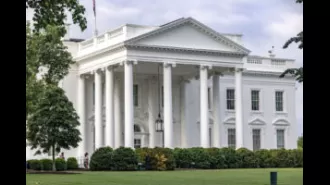The FTC's recent ban on non-compete agreements has sparked controversy among some companies.
FTC Chair Lina Khan heard numerous horror stories from workers after receiving over 26,000 public comments before the vote.
May 6th 2024.

The Federal Trade Commission, a government agency responsible for consumer protection, has made a bold move to ban most non-compete agreements. These are contracts that employees often sign, preventing them from working for a competing company or starting their own business. After reviewing over 26,000 public comments, the Commission voted 3 to 2 in favor of the ban on April 21st.
FTC Chair Lina Khan expressed concern for the countless stories of employees trapped in abusive workplaces due to these agreements. She shared one example of an employee who was unable to leave their job when their employer merged with a company whose values clashed with their own religious beliefs. This ban aims to give workers more freedom to switch jobs and ultimately increase wages by a staggering $300 billion per year.
However, not everyone is on board with this decision. Less than 24 hours after the vote, the U.S. Chamber of Commerce and the Business Roundtable filed a lawsuit against the FTC, claiming the agency had overstepped its authority. The Chamber had already expressed their opposition to the ban before the vote, stating that the FTC should not be able to dictate what they consider to be "unfair methods of competition." Commissioners Melissa Holyoak and Andrew Ferguson also disagreed with the ban, with Holyoak predicting legal challenges and eventual reversal.
The Chamber's statement argued that non-compete agreements have been in use for longer than the FTC itself, and until now, they have not been deemed illegal. They also expressed concern that if the FTC can regulate these agreements, they could potentially regulate or even ban other common business practices without approval from Congress.
Employment lawyer Daniel Turinsky believes that there may be more lawsuits to come. The ban is set to take effect in September 2024, but this is subject to change depending on the outcome of the lawsuits. This has left both employers and employees uncertain about the validity of existing non-compete agreements.
In response to the Chamber's lawsuit, FTC Chair Khan assured that the agency has the legal authority to implement this ban and is confident in its decision. The ban is seen as a step towards promoting fair competition and providing workers with more freedom and opportunities.
FTC Chair Lina Khan expressed concern for the countless stories of employees trapped in abusive workplaces due to these agreements. She shared one example of an employee who was unable to leave their job when their employer merged with a company whose values clashed with their own religious beliefs. This ban aims to give workers more freedom to switch jobs and ultimately increase wages by a staggering $300 billion per year.
However, not everyone is on board with this decision. Less than 24 hours after the vote, the U.S. Chamber of Commerce and the Business Roundtable filed a lawsuit against the FTC, claiming the agency had overstepped its authority. The Chamber had already expressed their opposition to the ban before the vote, stating that the FTC should not be able to dictate what they consider to be "unfair methods of competition." Commissioners Melissa Holyoak and Andrew Ferguson also disagreed with the ban, with Holyoak predicting legal challenges and eventual reversal.
The Chamber's statement argued that non-compete agreements have been in use for longer than the FTC itself, and until now, they have not been deemed illegal. They also expressed concern that if the FTC can regulate these agreements, they could potentially regulate or even ban other common business practices without approval from Congress.
Employment lawyer Daniel Turinsky believes that there may be more lawsuits to come. The ban is set to take effect in September 2024, but this is subject to change depending on the outcome of the lawsuits. This has left both employers and employees uncertain about the validity of existing non-compete agreements.
In response to the Chamber's lawsuit, FTC Chair Khan assured that the agency has the legal authority to implement this ban and is confident in its decision. The ban is seen as a step towards promoting fair competition and providing workers with more freedom and opportunities.
[This article has been trending online recently and has been generated with AI. Your feed is customized.]
[Generative AI is experimental.]
0
0
Submit Comment





